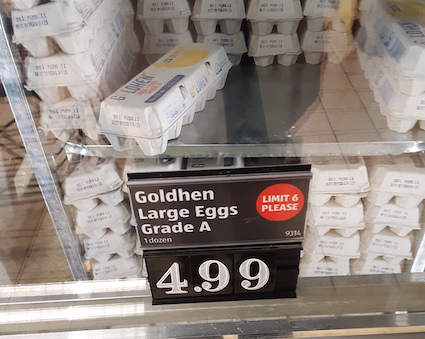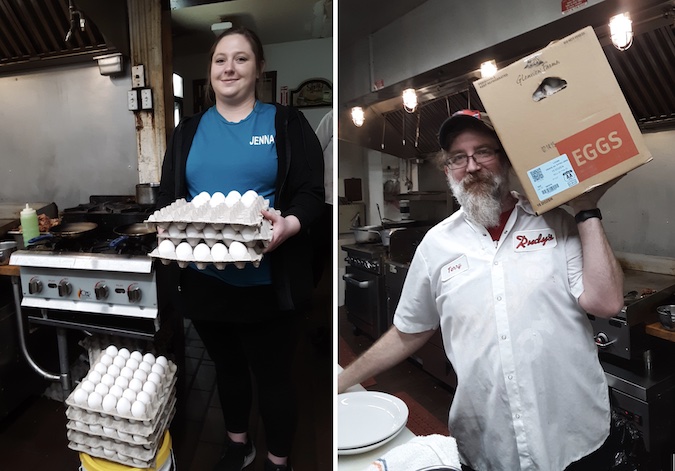Soaring egg prices put a strain on bakeries, diners
The soaring price of eggs is putting a strain on the budgets of restaurants, bakeries and families everywhere.
A year ago, eggs could sometimes be purchased for little more than a dollar a dozen, compared to recent months when they have hit more than $5 in some stores.
The rising cost is being blamed mostly on an avian flu, known as Highly Pathogenic Avian Influenza, which was first detected in North America in 2014
While the Center for Disease Control considers this type of virus a low risk to humans, it is a serious threat to poultry farms and owners of backyard flocks. As of December, more than 57 million egg-laying hens were lost since the outbreak began in February 2022. That surpasses the 50 million lost in the 2015 avian influenza outbreak, USA Today reported.
The loss of so many hens means far fewer eggs. USA Today reported the price of eggs jumped 11% in December from the month before. The average price of a dozen large grade A eggs in December hit $4.25, up from $1.79 a year earlier.

This sign on the egg case at Aldi’s in Medina reflects the cost of eggs which has nearly quadrupled in the past year.
Locally, eggs a year ago at Aldi’s and Dollar General in Medina were $1.29. This week, a sign on Aldi’s egg case showed a price of $4.99 per dozen, while at Dollar General they were $3.95, but had been $4.50, according to an employee.
Local restauranteurs and bakers say when you add inflation to that, it spells disaster for their businesses.
Jenna Pangrazio, fiancée of Rudy’s owner Brody Hoffmeister, said their cost for eggs has gone from $40 to $50 dollars per case to $110. They are spending $500 a week on eggs, she said.
“We have tried to keep our breakfast prices the same, but we are going to have to raise them if this keeps up,” Pangrazio said. “We know our customers are struggling, and we are trying not to raise prices.”
Terry Lake has cooked at Rudy’s for 20 years and other restaurants for 16 years. He’s never seen such price increases for eggs.
“January is always a bad month for restaurants, anyway, with people catching up after Christmas, and this just makes it worse,” he said.
Employees of Aldi’s and Dollar General are forbidden to talk to the media, however, a customer in Aldi’s said her son eats three eggs a day and she’s struggling to buy groceries.
“I’ve been buying egg whites to add to the eggs to stretch them,” she said. “Still it’s costing me $10 to feed him breakfast at home. I also don’t bake much anymore, because it’s so expensive.”
At the Village House in Albion, manager Spiro Mitrousis said a case of eggs wholesale is now $120, a price which a year ago was $20 to $30. A couple of weeks ago, the price soared to $160 a case.
“And that’s just one of the items that has gone up,” Mitrousis said. “We’ve kept good pricing, but last year we’ve had to keep raising prices, because everything is so expensive.”
He said he’s never had to cut back before, but with the increased cost of food and the minimum wage, he’s going to have to cut back hours.
“Before Covid, all the restaurants were open and we were all busy,” Mitrousis said. “Now, there are less restaurants open and we are less busy. It’s inflation that’s causing it.”
Beth Miller owns Wild Flour Bakery and Deli in Albion and she said she’s not making any profit on baked goods now, because of the high cost of eggs.
“I prefer not to raise prices, but I’m getting to the point where I can’t not do it,” she said. “My costs have increased more than 100 percent in six months. I’m paying $110 for 24 dozen eggs, which last me a week to a week and a half.”
Turkey is a main ingredient in some of her signature sandwiches and that has also skyrocketed in price.
“I’m scared to raise prices,” Miller said. “I’m a new business and I don’t want people to not come.”
Hannah Pollard of Medina is a home baker, who is also feeling the pinch. She uses 10 to 12 dozen eggs a week in the cookies, pies and small cakes she makes and sells. She has been bartering them for eggs with friends who have chickens at home.
She said the problem is compounded by the fact chickens don’t like the cold and don’t lay as many eggs when it’s cold and dark.
She said there has been a steady increase in the number of products she uses which have continued to rise in price. Brown sugar which was a dollar is now $1.69; butter which was $1.99 is now $3.99.
Add to that the shortage of oils, such as palm oil, which is used in Crisco. She uses Crisco in her pie crusts and the price of that has doubled.
“Two weeks ago I had to raise my prices,” Pollard said. “From $5 for half a dozen, I had to increase to $6 a half a dozen.”

Sarah Ebbs, co-owner of Pretty Sweet Bakery in Albion, said it is costing much more to create the baked goods at the business on Liberty Street in Albion.
At Pretty Sweet Bakery in Albion, the owners hunt for the best deal on eggs. The price peaked for them at $27.14 in late December for five dozen eggs. On Aug. 25, 2021, they were paying $5.92 for 60 eggs.
The increase has forced them to raise their prices, including selling a cookie from 80 cents each to $1.50.
“I absolutely hate raising our prices, especially in Albion because we’re not the richest community,” said Sarah Ebbs, Pretty Sweet co-owner with her mother Pamela Jenks. “People have been understanding.”
The bakery also is paying much more for butter, Crisco and boxes – “everything has gone up,” Ebbs said.
She is thankful the egg price is starting to come down. They were $19.98 this week for five dozen – still much more than they are used to paying.
Tina Oosterling of Medina, who owns A Kut Above, said she heard people talking about looking for egg substitutes. A search on the Internet revealed a number of products that can be used in place of eggs. While these substitutes can work culinary magic in some recipes, the finished product won’t be the same as when real eggs are used. A list of many substitutes can be found by searching “Egg substitutes.”
The Orleans Hub reached out to Kreher’s Eggs in Indian Falls for comment on the egg situation, and received a press release from the American Egg Board.
Emily Metz, president and CEO of the American Egg Board, said egg production capacity remains strong and eggs remain a good value.
“Egg farmers are doing everything they can to keep costs down and maintain a steady supply of the nutritious eggs Americans count on,” Metz said. “Prices reflect several factors beyond a farmers’ control, including inflation and supply chain challenges related to cost and availability of feed and grain, diesel fuel and shipping. Intermittent supply disruptions due to bird flu, which has affected egg farmers in several states, as well as commercial broiler and turkey farms, have had temporary impacts on commodity pricing.”
The good news, according to Metz, is that egg farms are recovering quickly. Most of the egg farms that were affected by avian influenza this year have recovered and are back to producing eggs. Nationwide, according to the USDA, there are approximately six percent fewer hens laying eggs right now than normally, so egg farms may be recovering, but they are not all the way back yet, Metz said.
“While no one can predict the future, egg sales have remained strong, even with temporary price increases, Metz added.
“People love eggs, and as one of the highest quality protein sources available, consumers know eggs are still a good value,” she said.
(Orleans Hub editor Tom Rivers contributed to this report.)


































































